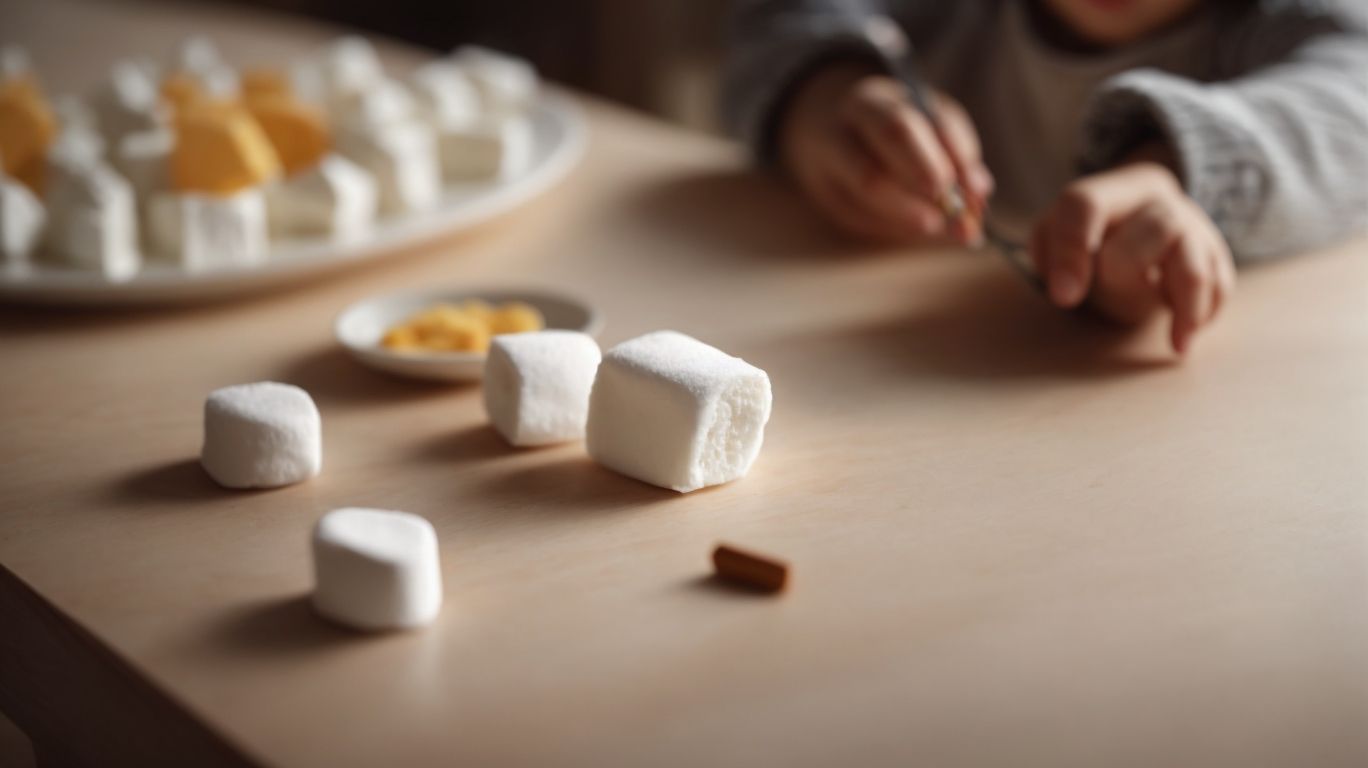Have you ever heard of the Marshmallow Test? Created to measure delayed gratification and self-control in children, this iconic experiment has provided valuable insights into human behavior and decision-making.
In this article, we will explore the origins of the Marshmallow Test, how it is conducted, what it measures, and its implications for life outcomes. We will also delve into the criticisms of the test and discuss how its principles can be applied in real life. Join us on this fascinating journey into the world of psychology and human behavior.
Contents
What Is The Marshmallow Test?
The Marshmallow Test, also known as the marshmallow experiment, is a psychological study conducted by Walter Mischel and his team to explore the concept of delayed gratification in children.
The study, initiated in the late 1960s, involved placing children in a room with a marshmallow and offering them a choice: either eat the marshmallow immediately or wait for a period of time and receive a second marshmallow as a reward. This simple yet insightful test revealed significant variations in children’s ability to delay gratification, leading to a deeper investigation into the factors influencing self-control and its impact on achievement and success.
Who Created The Marshmallow Test?
The Marshmallow Test was created by Walter Mischel, a renowned psychologist known for his work in cognitive psychology and self-control research.
Walter Mischel was born in Vienna, Austria, in 1930, and later migrated to the United States, where he made substantial contributions to the field of psychology. His research focused on exploring the role of self-control and personality processes in human behavior. The Marshmallow Test, conducted in the late 1960s, was a groundbreaking experiment that examined delayed gratification in children. This test involved placing a marshmallow in front of a child and informing them they would receive a second marshmallow if they could resist eating the first one for a specific period.
Mischel’s findings from the Marshmallow Test provided significant insights into the development of self-control strategies and their long-term implications on outcomes such as academic success, social competence, and mental health. The test demonstrated the importance of delayed gratification and the ability to regulate impulses in achieving future goals. Mischel’s research laid the foundation for understanding the psychological processes underlying decision-making and self-regulation, influencing subsequent studies in developmental psychology and cognitive neuroscience.
What Is The Purpose Of The Marshmallow Test?
The primary purpose of the Marshmallow Test is to examine the correlation between a child’s ability to delay gratification and their long-term outcomes in terms of habits, discipline, and overall development.
The study aims to shed light on how self-control and delayed gratification in early childhood can influence behaviors and choices in adulthood. By observing how children resist the immediate temptation of eating a marshmallow to receive a greater reward if they wait, researchers are able to gauge their self-regulation skills. The results of the test provide insights into the development of discipline, willpower, decision-making skills, and the ability to achieve long-term goals.
How Is The Marshmallow Test Conducted?
The Marshmallow Test is typically conducted by presenting children with a choice between immediate gratification or a larger reward if they can delay their gratification for a specified period.
During the test, children are given a marshmallow or a similar treat and told that they can eat it immediately or wait for a set amount of time to receive an additional treat.
The study usually involves observing the children’s responses, measuring the time they resist the temptation, and analyzing the strategies they use to distract themselves from the temptation.
The results of the test play a crucial role in understanding concepts like delayed gratification, self-control, and impulse regulation in childhood development.
What Does The Marshmallow Test Measure?
The Marshmallow Test serves as a measure of children’s ability to delay gratification, showcasing their levels of self-control, impulsivity, and their capacity to plan ahead.
Self-control is a vital skill assessed in this test, reflecting the ability to resist the immediate temptation for a greater reward in the future. It delves into how well a child can manage desires and impulses, displaying traits that may persist into adulthood.
Impulsivity is examined, highlighting the tendency for impulsive actions without considering long-term consequences. The capacity to plan ahead plays a crucial role in revealing a child’s cognitive development and executive functioning.
Delayed Gratification
Delayed gratification, a central theme of the Marshmallow Test, has been linked to greater success in life and is influenced by various character traits observed in study participants.
The Marshmallow Test, a famous psychological experiment conducted by Stanford psychologist Walter Mischel, involved offering a child a choice between a small reward immediately or a larger reward if they waited for a short period of time. Those who exhibited the ability to wait for the larger reward displayed better outcomes in various aspects of life, such as academics, career success, and overall well-being.
Individuals who excel in delaying gratification often possess traits such as self-control, patience, impulse regulation, and the ability to focus on long-term goals over immediate desires. This capacity to resist temptation and exercise self-discipline is crucial for achieving sustained success in both personal and professional domains.
Self-control
Self-control, as assessed in the Marshmallow Test, is considered an educational trait that manifests through individual characteristics such as mindset and grit.
It is intriguing how the ability to delay gratification in children during the Marshmallow Test has been linked to long-term success and well-being. This phenomenon brings to light the significance of self-regulation in academic and personal development. The test, which presents a child with a choice between immediate pleasure and delayed but greater rewards, reveals insights into their capacity for impulse control and perseverance.
Individuals with strong self-control often exhibit traits such as resilience, determination, and focus. They are able to resist temptations and stay committed to their goals, illustrating the power of mindset in guiding behavior.
Impulsivity
Impulsivity, an aspect measured in the Marshmallow Test, reflects cognitive and behavioral tendencies that may correlate with various influences in a child’s environment.
Initially conducted by psychologist Walter Mischel in the 1960s, the Marshmallow Test introduced the idea of delayed gratification and self-control in children. This test, where a child is given a choice between immediate reward (one marshmallow) or waiting for a larger reward (two marshmallows) by resisting the temptation, highlights the importance of impulse control and decision-making at an early age.
Ability to Plan Ahead
The ability to plan ahead, a component of the Marshmallow Test, has been linked to developmental outcomes such as improved SAT scores and the responsiveness to incentives.
Developing strong planning skills is crucial, as evidenced by research showing that individuals who exhibit foresight and self-control tend to achieve higher academic success. In the context of the Marshmallow Test, where children’s ability to delay gratification was assessed, those who could wait to receive a greater reward later showcased better long-term outcomes.
This capacity for delayed gratification not only impacts academic achievement but also influences various life domains. Through effective planning, individuals can set goals, create strategies, and envision long-term rewards, leading to a more organized and successful life trajectory.
What Are The Results Of The Marshmallow Test?
The key results of the Marshmallow Test indicate a significant relationship between children’s behavior, cultural influences, background factors, and intelligence levels.
Children who displayed the ability to delay gratification in the test often showed higher levels of self-control and willpower, traits that are linked to future success in various aspects of life. Cultural influences played a crucial role, with children from collectivistic cultures often demonstrating better delayed gratification skills due to the emphasis on patience and long-term goals within their societies.
Background factors such as socioeconomic status and family structure also impacted children’s responses, with those from more stable and supportive environments exhibiting stronger self-regulation abilities. Intelligence, although not the sole determining factor, was found to play a role in how children approached the challenge, as higher cognitive abilities were associated with better self-regulation.
Children Who Were Able To Delay Gratification Had Better Outcomes In Life
Children who demonstrated the ability to delay gratification in the Marshmallow Test exhibited better outcomes in various aspects of life, underscoring the importance of habits, discipline, and parental influences.
Research suggests that those who could resist the immediate temptation for a larger reward later were found to have higher academic achievement, improved social skills, and better emotional regulation in adulthood. This ability to delay gratification not only enhances academic performance but also contributes to forming strong relationships and managing stress effectively. The development of self-control through early experiences and reinforcement plays a crucial role in shaping an individual’s success trajectory, impacting career advancement, financial stability, and overall well-being.
Self-control is considered a foundational skill that underpins various accomplishments, providing a buffer against impulsive decisions that may hinder long-term goals.
Children Who Gave In To The Temptation Had More Struggles In Life
Children who succumbed to temptation during the Marshmallow Test faced more challenges and struggles in life, highlighting the importance of habit training and the influence on educational achievement and character traits.
These children often exhibited difficulties in maintaining focus and self-control, leading to impulsive decision-making and lower academic performance.
Their lack of delayed gratification hindered the development of essential skills such as perseverance, patience, and critical thinking.
These individuals were found to struggle more with stress management and emotional regulation, impacting their overall well-being and social interactions.
The long-term consequences of failing the test encompassed a range of negative outcomes, influencing various aspects of their lives from education to relationships and beyond.
What Are The Criticisms Of The Marshmallow Test?
The Marshmallow Test has faced criticisms related to potential cultural biases, the lack of long-term follow-up studies, and the consideration of other influencing factors in the results.
Researchers have highlighted concerns that the original Marshmallow Test may not be culturally neutral, potentially favoring certain socio-cultural backgrounds over others. This raises questions about the generalizability of the findings to diverse populations. The absence of long-term monitoring in many studies limits the understanding of how children’s ability to delay gratification evolves over time.
Critics argue that variables like socioeconomic status, home environment, and prior experiences with delayed gratification are significant factors that could impact a child’s performance in the test. These aspects may not have been sufficiently accounted for in the original research design.
Cultural Bias
One of the primary criticisms aimed at the Marshmallow Test pertains to potential cultural biases that may influence the interpretation of the results within academic and psychological contexts.
These biases stem from the fact that the original Marshmallow Test was conducted primarily on children from Western cultures, particularly the United States, which might not translate universally across different cultural backgrounds. Cultural norms, values, and experiences can significantly impact how individuals perceive and approach tasks like delayed gratification, which is central to the test.
The social and environmental factors that shape behavior can vary dramatically across societies, leading to discrepancies in how children respond to such experiments.
Lack Of Long-term Follow-up
**Critics** have highlighted the Marshmallow Test’s limitation in terms of the **absence** of extensive long-term follow-up studies to replicate the initial outcomes and assess sustained habits in participants.
Replication studies play a crucial role in the realm of academic research, providing a robust foundation for the generalizability and validity of findings. The lack of long-term follow-up in the context of the Marshmallow Test raises questions about the enduring nature of self-control, delayed gratification, and potential implications for later success in life. Evaluating sustained behavioral habits over time through longitudinal studies can offer valuable insights into the development and persistence of certain traits or behaviors beyond the immediate test environment.
Other Factors That Affect The Results
Critics suggest that the Marshmallow Test may overlook other significant factors that could influence the results, such as environmental influences, educational backgrounds, and individual traits and characteristics.
These external factors play a crucial role in shaping how children respond to delayed gratification tasks. For instance, a child’s family environment, including socioeconomic status and parenting styles, can greatly impact their ability to resist temptation during the test. The educational context in which a child is raised, such as the quality of schooling and access to resources, can also affect their decision-making process. Personal traits like impulsivity and self-control are essential components that can influence the outcomes of such psychological experiments.
How Can The Marshmallow Test Be Applied In Real Life?
The insights from the Marshmallow Test can be applied in real-life scenarios to educate individuals about the importance of self-control, understanding impulsivity, and planning ahead for long-term success.
Self-control, a key element in the Marshmallow Test findings, translates to various aspects of life. Whether it’s resisting the temptation to procrastinate on a project deadline or managing impulses to make healthier lifestyle choices, honing this skill can lead to improved decision-making and goal attainment.
Understanding impulsivity helps individuals recognize triggers that may lead to undesired actions, allowing for proactive strategies to avoid impulsive behavior. By teaching individuals to plan ahead and consider the consequences of their actions, they can set themselves up for success in personal relationships and professional endeavors.
Teaching Children Delayed Gratification
Educators and parents can utilize the concepts of the Marshmallow Test to teach children the value of delayed gratification, offering training, educational incentives, and opportunities for developmental growth.
One effective strategy in teaching children about delayed gratification is to create a structured environment that encourages self-discipline. By setting clear rules and expectations, children can learn to delay immediate rewards for greater long-term benefits. Consistency plays a crucial role in reinforcing this behavior, ensuring that children understand the importance of controlling their impulses.
Integrating educational incentives, such as setting goals or milestones, can further motivate children to practice delayed gratification. By linking desirable outcomes with patience and perseverance, children can see the direct correlation between self-control and positive results.
Improving Self-control
Enhancing self-control, drawing from the Marshmallow Test insights, involves understanding the environmental influences and internal factors that shape individual responses and decision-making processes.
Research stemming from the Marshmallow Test emphasizes the critical role of situational factors in determining an individual’s ability to delay gratification and exhibit self-control.
For instance, the presence of distractions or temptations in one’s surroundings can significantly impact self-regulation abilities, making it challenging to resist immediate rewards in favor of long-term benefits.
Individual characteristics such as temperament, cognitive abilities, and emotional regulation also play a crucial role in determining the level of self-control a person can exert.
Understanding Impulsivity
Delving into the concept of impulsivity, informed by the Marshmallow Test findings, requires a nuanced understanding of behavioral influences, academic perspectives, and dispelling common myths.
When examining the nature of impulsivity, it becomes essential to explore the psychological factors that contribute to impulsive behavior. This includes how individuals process rewards, make decisions under uncertainty, and regulate their impulses.
From an academic viewpoint, researchers have debated whether impulsivity is a stable trait or a situational response. By delving deeper into these discussions, one can unravel the complexities of impulsivity and its impact on decision-making processes. Contrary to popular belief, impulsivity is not solely a matter of lacking self-control but encompasses a range of cognitive and emotional processes. For a fascinating example of this, check out Understanding the Marshmallow Test in Psychology.
Planning Ahead For Success
Planning ahead for success, as advocated by the Marshmallow Test principles, involves setting goals, leveraging incentives, and cultivating a growth mindset and resilience to achieve desired outcomes.
The process of strategic planning based on insights from the Marshmallow Test emphasizes the crucial aspect of goal setting as a roadmap for accomplishing ambitions. By clearly defining objectives, individuals can establish a clear path towards their aspirations, allowing them to navigate challenges with focus and determination.
- Incentive structures play a pivotal role in motivating people to stay committed and persevere through difficulties. By incorporating rewards and reinforcements that align with desired behaviors, individuals are more inclined to remain dedicated to their goals, fostering a sense of achievement and progress.
- The mindset cultivated through strategic planning influences how individuals approach obstacles and setbacks. Embracing a growth mindset allows individuals to view challenges as opportunities for development, leading to continuous improvement and adaptability in the pursuit of success.
- Building resilience and grit is essential in sustaining long-term success. The ability to overcome obstacles, learn from failures, and persist despite difficulties fosters a sense of resilience that enables individuals to navigate the complexities of their journey towards achievement.
Frequently Asked Questions
What is the Marshmallow Test in Psychology?
The Marshmallow Test is a famous psychological experiment conducted by Walter Mischel in the late 1960s. It is a study on delayed gratification, where children were offered a choice between a small reward (one marshmallow) immediately or a larger reward (two marshmallows) if they waited for a short period of time.
What was the purpose of the Marshmallow Test?
The purpose of the Marshmallow Test was to study self-control and its impact on future success in life. The researchers wanted to see if children who were able to delay gratification and wait for the second marshmallow would have better outcomes in terms of academic performance, behavior, and overall success.
How was the Marshmallow Test conducted?
In the original experiment, children were seated at a table with a marshmallow in front of them. They were told that they could either eat the marshmallow right away or wait for the researcher to come back and receive two marshmallows. The researcher then left the room for 15 minutes, and the child’s behavior was observed through a one-way mirror.
What were the results of the Marshmallow Test?
The results of the Marshmallow Test showed that children who were able to delay gratification and wait for the second marshmallow had better outcomes in life. They had higher SAT scores, better social skills, and were less likely to engage in risky behaviors. This suggests that self-control and delayed gratification are important skills for success.
Are there any criticisms of the Marshmallow Test?
Yes, there have been criticisms of the Marshmallow Test, including its sample size and lack of diversity, as well as the inability to account for external factors such as socioeconomic status and cultural differences. Some argue that the test may not be a reliable predictor of future success.
Can delayed gratification be learned?
Yes, studies have shown that delayed gratification can be learned and improved upon. Children who were taught strategies to distract themselves or think about the future were more likely to be able to delay gratification in the Marshmallow Test. This suggests that self-control is not a fixed trait and can be developed through practice and strategies.




